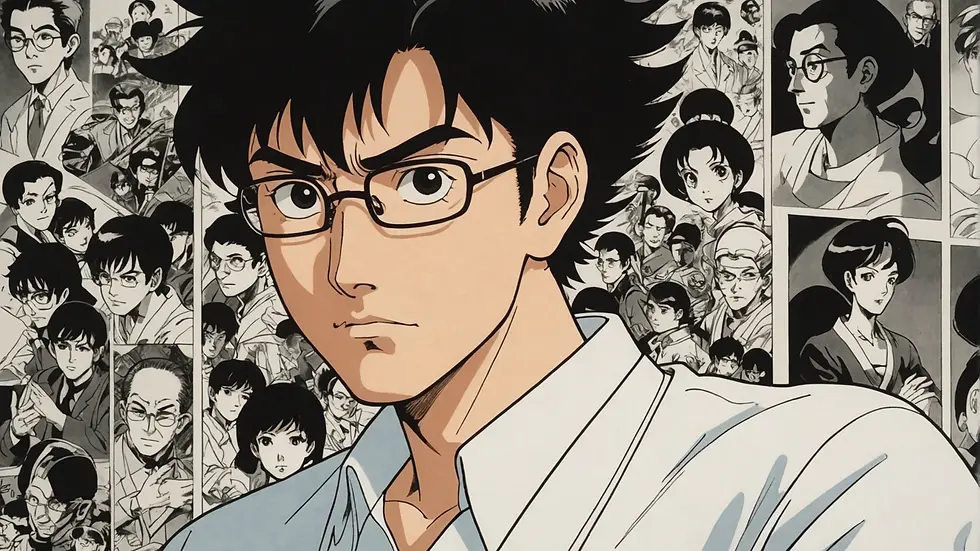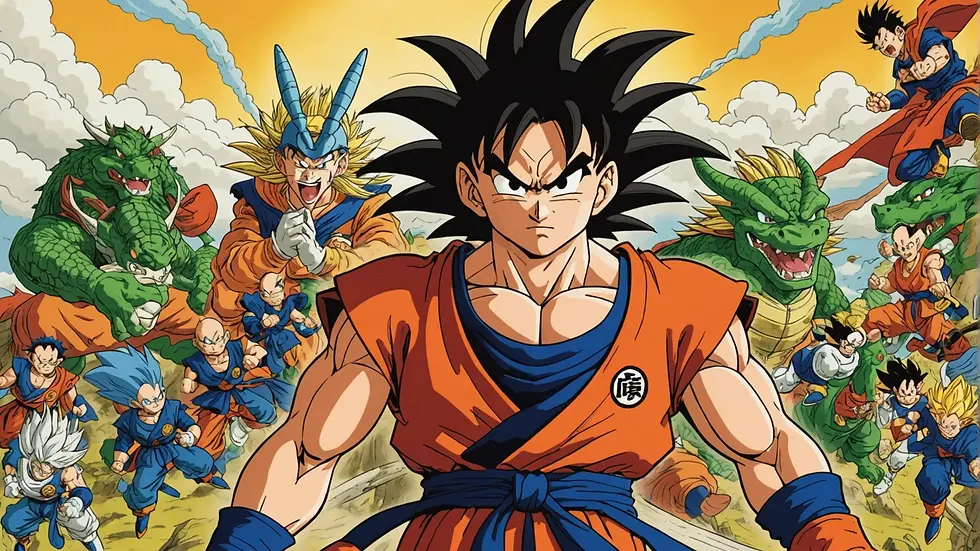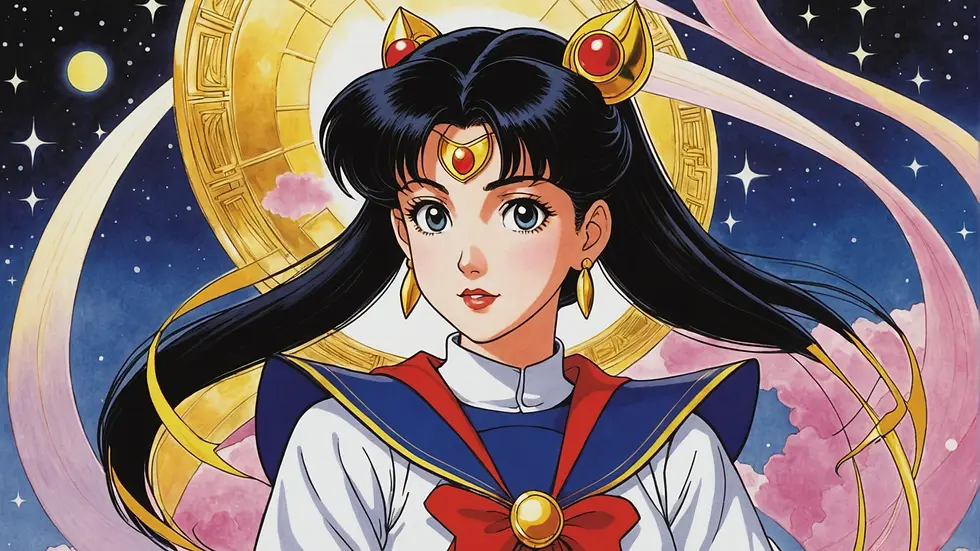Uncovering the Enigmatic Legends of Manga Storytellers You Need to Know About
- ChatStick For Brand
- Oct 27, 2024
- 6 min read
Manga is more than just comics; it is a cultural phenomenon that has enchanted readers worldwide. Each renowned series stems from the creativity and vision of a storyteller who often redefines the medium. In this article, we will explore some of the most influential manga storytellers, highlighting their unique contributions and the stories that have inspired millions over the years.

Osamu Tezuka: The God of Manga
Osamu Tezuka, born in 1928, is often referred to as the "God of Manga" due to his groundbreaking contributions to the medium. His visionary approach not only elevated manga to a respected art form but also established many of the narrative and artistic conventions that are now standard in the industry.
Tezuka's work encompasses a wide range of genres and themes, but his most iconic series, "Astro Boy" (Tetsuwan Atom), stands out for its pioneering blend of adventure and profound moral inquiry. Through the story of a robotic boy with human emotions and ethical dilemmas, Tezuka explored complex issues such as identity, the nature of humanity, and the implications of technological advancement.
His innovative storytelling techniques, including the use of cinematic panel layouts and dynamic character expressions, helped to create a more engaging reading experience. Tezuka's influence extends beyond his own creations; he inspired countless artists and writers, shaping the future of manga and anime as we know it today. His legacy is a testament to the power of storytelling and the potential of manga to address deep philosophical questions while entertaining audiences of all ages.
Tezuka's stories are remarkable for addressing significant societal issues. For example, "Phoenix" explores the cycle of life and death through a complex narrative filled with emotional depth. By the time of his passing in 1989, he had penned over 700 titles, influencing countless creators. His dynamic pacing and cinematic storytelling techniques have become staples in the manga industry.

Akira Toriyama: Crafting Legends in a World of Adventure
Akira Toriyama's contributions to manga are monumental, particularly highlighted by the groundbreaking success of "Dragon Ball," which debuted in 1984. This series not only redefined the shounen genre but also set a new standard for storytelling and character development in manga.
"Dragon Ball" introduced readers to a rich universe populated by a diverse array of characters, each with unique abilities, motivations, and personalities. The series masterfully blends action, adventure, and humor, captivating audiences and making it a cultural phenomenon. Toriyama's innovative approach to battle sequences, characterized by dynamic pacing and imaginative powers, transformed how conflicts are depicted in manga, paving the way for future series.
Moreover, "Dragon Ball" laid the groundwork for the "power-up" trope and the concept of training arcs, which have since become staples in shounen narratives. The series' influence extends beyond Japan, inspiring a global fandom and spawning an entire franchise that includes anime adaptations, movies, video games, and merchandise. Toriyama's ability to weave humor with intense action and deep friendships resonated with readers and viewers alike, ensuring "Dragon Ball" remains a beloved and enduring cornerstone of the manga landscape. His work has influenced countless creators, solidifying his status as one of the most significant figures in the history of manga.
Toriyama's storytelling shines through his unique blend of humor and action. For instance, the character Goku's light-hearted nature stands out in stark contrast to the intense fight scenes, captivating an audience of all ages. "Dragon Ball" became a foundational series, leading to a franchise worth billions, including successful anime series and video games. The series, with its themes of friendship and determination, has inspired numerous spin-offs and adaptations, solidifying Toriyama's place in manga history.

Hayao Miyazaki: The Magic of Storytelling
Hayao Miyazaki, primarily celebrated for his enchanting animated films, has also made significant contributions to the world of manga, showcasing his multifaceted talent as a storyteller and artist. One of his most notable early works, "Nausicaä of the Valley of the Wind," exemplifies his exceptional narrative ability and artistic vision.
Published initially as a manga series in the early 1980s, "Nausicaä" unfolds in a richly imagined post-apocalyptic world where humans coexist with colossal insects and toxic jungles. The series is not only visually stunning, characterized by intricate and lush artwork, but it also delves deep into profound themes that resonate with contemporary audiences.
Central to the story is a strong emphasis on environmentalism, exploring the delicate balance between humanity and nature, and the consequences of ecological neglect.
Miyazaki’s portrayal of Nausicaä, a compassionate and brave young princess, reflects his belief in the importance of understanding and protecting the environment. Through her journey, readers are invited to contemplate issues of warfare, the moral complexities of survival, and the interconnectedness of all living beings. This blend of rich world-building and thoughtful themes has established "Nausicaä" as a seminal work, influencing not only the manga genre but also the larger discourse on environmental stewardship.
Miyazaki’s storytelling prowess in manga laid the groundwork for his later cinematic successes, as many themes and motifs found in "Nausicaä" reappear in his animated films. His ability to combine captivating narratives with social commentary continues to inspire creators across various mediums, reinforcing his status as a master storyteller whose work transcends the boundaries of manga and animation alike
Miyazaki’s characters, whether human or fantastical, are richly developed. In "Nausicaä," the titular character's journey resonates with readers, prompting them to consider their role in the world. His narratives are not just entertaining; they encourage readers to develop a deeper connection with the environment and reflect on ethical dilemmas.
Naoko Takeuchi: The Voice of Empowerment
Naoko Takeuchi changed the landscape of manga through her creation of "Sailor Moon," serializing it in the early 1990s. This series not only revolutionized the magical girl genre but also introduced themes that empowered a whole generation.
Takeuchi's narrative emphasizes the strength of female friendship and the journey toward self-acceptance. Characters like Usagi Tsukino are relatable and multi-dimensional, allowing readers to see themselves in the stories. "Sailor Moon" has led to a rich cultural impact, inspiring adaptations in various media, including a successful anime series and merchandise that still resonates today. The messages of empowerment found in Takeuchi’s work continue to inspire.

Eiichiro Oda: The Master of Long-term Narrative
Eiichiro Oda is the creative force behind "One Piece," which debuted in 1997 and quickly became a global phenomenon. Oda's world-building sets "One Piece" apart, featuring a vast array of characters and intricate lore that expands with each arc.
With over 1,000 chapters published, Oda masterfully weaves various plots and subplots, ensuring that every character's journey feels important. The balance between humor and emotional moments resonates deeply with fans. Oda’s dedication demonstrates that manga can have a long-term narrative that evolves, keeping readers engaged for decades.
Yoshihiro Togashi: Breaking the Mold
Yoshihiro Togashi is celebrated for his series "Yu Yu Hakusho" and "Hunter x Hunter." His ability to craft complex narratives and morally ambiguous characters has distinguished him in the industry.
In "Hunter x Hunter," Togashi challenges traditional shounen tropes through deep character development and complex story arcs. For example, the character Killua Zoldyck grapples with his past as an assassin while forging meaningful friendships. Togashi's approach has redefined what readers expect in terms of character complexity and narrative depth, inspiring many contemporary authors.
Rumiko Takahashi: The Queen of Romance and Comedy
Rumiko Takahashi has made her mark as a leading female manga creator, known for beloved series like "Urusei Yatsura," "Ranma ½," and "Inuyasha." Her knack for blending romantic comedy with supernatural themes resonated with readers of all ages.
Takahashi's ability to seamlessly shift between humor and emotional depth shines in works such as "Ranma ½." Here, characters navigate complex relationships amid humorous transformations. Her success has propelled her career and inspired future female creators to break into a predominantly male industry, leaving a significant impact on manga storytelling.
Taika Waititi: The New School of Storytelling
Though not a traditional manga creator, Taika Waititi's approach to storytelling has influenced various mediums. Known for his signature blend of humor and heartfelt moments, Waititi embodies the essence of engaging narratives that resonate with audiences.
His films explore authentic emotions while addressing larger societal concepts, echoing the spirit of manga. Recently, adaptations of his work into manga showcase the collaborative nature of storytelling, celebrating diverse influences and uniquely blending narratives that appeal to global audiences.
Celebrating the Legends of Manga Storytelling
Manga storytelling is a vibrant tapestry woven from the experiences and creativity of its legendary creators. The storytellers discussed here offer entertainment while prompting reflection on humanity and society.
As emerging creators draw inspiration from these influential figures, they continue to shape the world of manga. Recognizing the contributions of these legends helps us appreciate the power of storytelling and the limitless imagination it inspires. The art of manga storytelling evolves, reflecting each new voice while keeping the heart of its rich legacy alive.



Commentaires